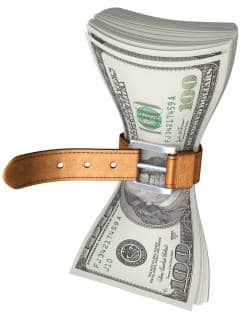 Recently I posed a home staging business question, Home Stagers When Do You Cut Your Rates? I described various scenarios and what potential clients may say to put pressure on you and asked for feedback from my fellow home stagers.
Recently I posed a home staging business question, Home Stagers When Do You Cut Your Rates? I described various scenarios and what potential clients may say to put pressure on you and asked for feedback from my fellow home stagers.
Now it’s time for my thoughts on this subject, plus I’ll share a terrific example of how home stager Amy handled this common home staging business dilemma.
From the time I started my home staging business, Six Elements in 2002, I’ve always been one of the most expensive home stagers in my city— or at least I was beginning in 2003 when I really figured out the right pricing strategy and my profits went up almost 500%!
Rather than competing on price, I marketed myself as THE expert home stager in my area. I wanted people to come to me when they were looking for the best.
My clients knew they were going to have to pay more for my services, and it was a much more effective marketing strategy than promoting myself as the cheapest stager out there.
Not only do I recommend against competing on price, I also recommend against discounting your rates, as Graduates of the Staging Diva Home Staging Business Training Program will attest. The following story, which was sent to me by a home stager named Amy, is a shining example of why I hold this philosophy:
“Prove your worth or cheapen your value? That’s the scenario I faced after a lengthy game I found myself playing with a local real estate agent and his client.
The agent had called me on St. Patrick’s Day to provide him with an estimate for staging a vacant property for one of his clients. The next business day, I put together a bid for the agent with my price and the furniture rental estimates.
After a week with no word back from the agent, I called him and he told me he’d check with his client to see whether a decision had been made. This went on for three weeks, which is not something I’m used to. Generally a prospective client will get back to me within a few days with a yes or no answer. In this case, though, the homeowner kept going through his agent trying to get me to negotiate my rate, which I refused to do.
Just before Easter, the agent gave me the homeowner’s number so I could follow up myself, which I did—once a week—until the seller asked to meet me in person. He told me he had eight homes he would like to stage, and he tried once more to get me to lower my rate.
I had an important decision to make that day.
My choices were to sell him on my value as a credible home stager or to discount my rate and cheapen my value. After all, how could I be sure there were eight properties involved?
After reviewing my estimate, I confidently showed the homeowner my licensing, insurance, portfolio and other credentials.
I walked out of there with my 50% deposit check and a date to stage the home.
I was also given the address of the next home I was to stage—his $2 million country club residence. In addition, I was shown the mortgages for 25 properties he wanted to flip within the next month.
I hung onto my dignity and snagged a reliable and steady staging income. Playing a little hardball kept me in the game. Staging homes is a joy, but it is also my career. This experience taught me to never forget that the profit margin of a well-staged home will exceed my fees every time. I should never compromise my own fair value pricing, but instead, focus on selling my worth as a professional home stager.”
Amy, kudos for holding your ground during negotiations! It definitely paid off.
Home stagers, have you been in a similar situation? How did you handle it? Please share your experiences below.

Debra Gould, The Staging Diva®
President, Six Elements Inc. Home Staging
Debra Gould has been using her creative talents to stage homes since 2002. She knows how to make money as a home stager and shares her formula for staging business success in the Staging Diva home staging courses.


I think one thing that really sticks out for me is one of Amy’s last comments: “I should never compromise my own fair value pricing, but instead, focus on selling my worth as a professional home stager.”
The key word for me here is “fair” pricing. Once I got over the fear of asking for a staging fee, I learned that you have to set a price that you feel is fair for you, the client, and the industry – then stick to it. My prices have certainly gone up since I started in 2007, but I feel that they are fair, competitive and a good value for the price.
Home staging is my career too and we have to remember that; and not let others dictate our price. You are worth whatever you feel you are worth!
Debbie Fiskum, Perfect Transformations Home Staging & Design, Denver
Well-said Debbie! Your comment “you are worth whatever you feel you are worth,” is a key one in that some home stagers suffer from low self esteem and set their prices low because they don’t FEEL WORTHY of being well paid.
This becomes a vicious circle, actually a downward spiral, because then they don’t make money and feel like they’ve failed in their business, which then reinforces their original belief that they’re not worthy of success!
This is one of the reasons I write so much about ways to boost your confidence and share examples of other stagers. For more on this see:
https://stagingdiva.com/homestagingbusiness/category/home-stager-confidence/
I had a similar experience with a realtor and a vacant property. It was a lower priced property and the realtor asked me to bid on staging the home. I presented a bid for rental furniture, accessories, and completing some items that had not been fixed like a bathroom mirror, shower rod, etc. along with an estimate of my time and staging fees. They also strung me along for several weeks with no answer. When I finally did get an answer it was the same as with Amy, the homeowner didn’t want to spend that much and asked if I could cut my rates. My answer to them was “No, If they wanted a professional job of staging the home that would be the bottom line.” Regretfully I didn’t get the job but it is worse for them because the home is still on the market.
Pamela, your experience is very typical, especially on lower priced homes. This is why I don’t do free estimates in person. Takes way too much time and the percentage that lead to business is very low.